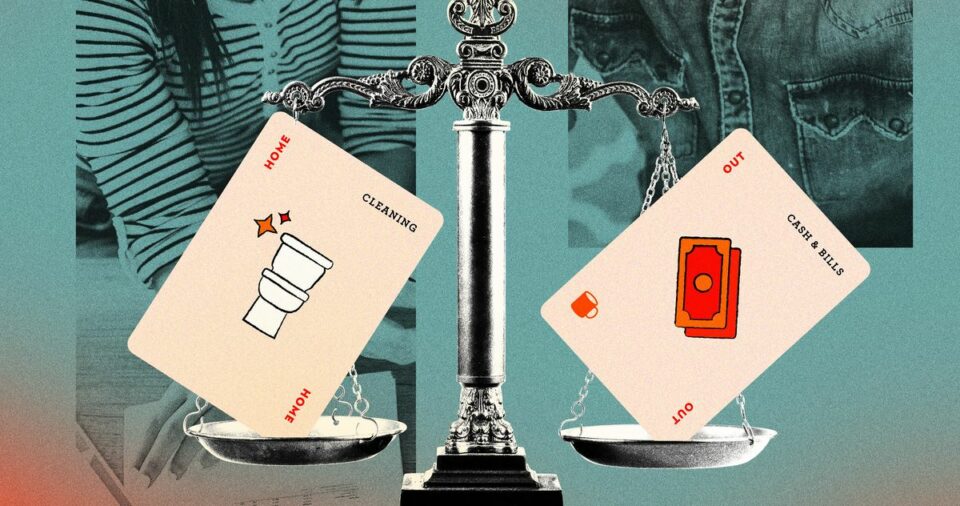The incident that emboldened attorney Eve Rodsky to write her first book, Fair Play, has been shared so many times over the last four years — by Rodsky on her speaking tour, and by her devotees in Facebook groups and at book-club gatherings — that it’s nearly become synonymous with the book itself. But if you haven’t heard of Fair Play or about its origin story: In 2011, Rodsky, then a newly postpartum attorney, was grabbing her toddler from preschool when her husband texted her, “I’m surprised you didn’t get blueberries.” As in, berries for his smoothies. “I had a breast pump next to me, newborn-baby gifts that needed returning in the back seat, and I had just started at a new law firm and had a contract in my lap with the pen stabbing me in the vagina,” Rodsky, 46, recaps from her home office in Los Angeles. “I’d become the she-fault parent.”
The text spurred Rodsky to write what would become a New York Times best-selling book and to create an accompanying card deck that promises to help couples recognize and correct imbalances in their domestic workload. Reese Witherspoon named it her October 2019 book-club pick, and in 2022, the actress’s media company, Hello Sunshine, released a Fair Play documentary film. (Rodsky’s investor husband, Seth, co-founded Witherspoon’s media company, Hello Sunshine. Suffice it to say, he’s made up for the blueberry remark.)
Some suggest Fair Play to their friendsbecause it’s a wake-up call. Women compare themselves to Eve (Bible, not Rodsky) eating the apple, unable to unsee the imbalance that’s characterized their relationships. “You will feel seen” is a common text message accompanying a link from Amazon. But just over four years since its publication, as the book enters the pantheon of parenting thought leadership, others have taken to using it as something more: an exacting, cult method for managing their marriage. Their primary tool is the Fair Play Deck, which debuted in October 2020, sells for $19, and features 100 oversize playing cards, all labeled and cheerfully illustrated with household or family duties like Cleaning, Calendar Keeper, Pets, Civic Engagement and Cultural Enrichment, and Laundry. Couples — namely straight couples, though Rodsky says LGBTQ+ couples also use Fair Play — lay the cards out according to who currently manages each one, and a preposterously imbalanced tarot-reading dumpster fire inevitably stares back at them, with wives owning the lion’s share of the responsibilities. In the Fair Play script, this moment serves as a springboard for the first of many hard conversations about gender inequality. Once both partners internalize Rodsky’s “All time is created equal” battle cry, the cards are supposed to be fairly redistributed and the marriage saved from years of simmering resentment.
There are highly specific rules to follow after you divide the cards: Players must assume full responsibility for their cards, a strategy dubbed “C.P.E.” — Conception, Planning, Execution — that was designed to combat the male tendency to execute (pick up milk from the market when asked) but leave the conceiving (recognizing that your toddler only drinks 2 percent milk) and planning (monitoring the fridge to ensure the 2 percent doesn’t run out) to the female partner. In other words, as Rodsky told me, “Own. Your. Shit.” Partners also must agree to a Minimum Standard of Care (or “M.S.C.”) for tasks, meaning that even if the owner of the Garbage card is fine with empty pizza boxes piling up on the kitchen counter, he may still have to throw them out promptly.
When a relationship is already fairly equitable and both partners are on board for reshuffling, the system can provide an effective and straightforward tune-up. But often, several persistent challenges emerge. Implementing the practice is time-consuming and so is maintaining it. In fact, in all of my interviews, I failed to find a couple who followed the rules to a tee for longer than a few months. Just to get Fair Play off the ground, the initiator has to read the book, procure the cards, create an organizational system (I’ve seen everything from Google spreadsheets so detailed they resemble stock-portfolio trackers to oversize whiteboards dotted with custom Etsy chore magnets), then explain it all to a partner. You can also hire a Fair Play Facilitator trained by Rodsky’s Fair Play Policy Institute to help you live the Fair Play way. (The certification runs $2,500 and includes 12 hours of live, virtual instruction and a final exam.) There’s no standard rate to hire one of the Institute’s facilitators, as many have additional certifications and areas of expertise, from personal organizing to masters in social work. There are also several very active Facebook groups (ranging from 800 to 60,000 members) where women convene for Fair Play tip-swapping. A woman recently polled one group to ask whether her spouse should be expected to pick up his own socks if she owned the Cleaning card. Another turned to the Fair Play community after a family member died, seeking advice on how to ask her partner to cover her chores while she grieved.
All this time and effort falls overwhelmingly on women by design.
Rodsky’s mother, a social-work professor, inspired Rodsky’s decision to charge women with the brunt of the upfront grunt work. “She taught me that social movements start with the oppressed,” Rodsky says, because “people who want the status quo maintained” won’t push for change. As Rodsky recently said on a podcast, “You teach somebody something now because it will benefit your future hours.” But the prep work has pushed many women away because, as one Brooklyn mother put it, it’s “more than I can handle right now.”
Stories also abound of partners agreeing to cards only to quietly drop them. This sometimes leads to “chore chicken,” a resentment-fueled phenomenon in which Partner A refuses to pick up the slack on Partner B’s tasks, so the dirty dishes fester or shirts languish at the dry cleaners. Partner A silently rages because this isn’t how C.P.E is supposed to work.
Sophie, a 49-year-old HR executive in San Diego, thought her daughter’s August 2022 departure for college was the ideal time to conduct a chore audit in her marriage. She and her husband considered themselves feminists, but “we’d gotten trapped in certain roles. I handled the cooking, finances, planning the Christmas parties, doctor’s appointments. And I’ve generally been the breadwinner,” she says. Sophie was nervous about how he’d respond to the game, but “he was open and it led to a great discussion.”
They laid their cards on the dining-room table then re-dealt their deck. Sophie giddily relinquished the Family Gifts card. She had been buying her mother-in-law birthday presents for 20 years and felt, as she says, “done.” But one month later, as her mother-in-law’s birthday approached, her husband asked, “I know I’m in charge of this now, but can you give me some ideas? Should I get her a manicure?” Sophie refused. “He responded, ‘Are you fucking kidding me? You’re not going to take one minute to help me?’” she recalls. “It would have taken much less energy for me just to tell him, ‘Yeah, get her a $100 gift certificate to Chateau Nails,’ but I wanted to drive home the point. There was some liberation even just saying that.”
Other spouses, when invited to play fair, have responded with “I get it. You want me to do more. But I don’t want to play a game. Just tell me what to do.” That’s what Paige Connell, 33, a Boston mom of four under 6, heard when she first showed her husband the deck. “But that places the burden right back on the woman,” she says. “I don’t want to be his project manager.”
The cards stayed in the deck for six months as they attempted to improvise their domestic duties. Paige had to remind him to order groceries, or he’d forget to run the dishwasher overnight, adding another layer of tumult to the morning roller coaster of getting multiple kids to school. Finally, Paige declared, “If you’re not willing to show up and even try this, I’d prefer you just step aside.” He relented. In June 2023, she used the cards to create an Excel spreadsheet that helped him visualize the tasks and Paige says they have “found our groove.”
“There are times when he’ll text me, ‘I’m sorry, I didn’t get to the dishes,’” Paige says, “but it’s infrequent and doesn’t feel like he’s skirting the responsibility.” However, on Paige’s TikTok accounts a few months ago, she vented to her nearly 120,000 followers that her husband had bungled the groceries card: “It would have been easier for me to just do the fucking groceries myself,” she deadpanned.
Lizzie, 28, from Buffalo, says her husband played along with the cards for a month before losing interest and erupting. “He said, ‘I’ve helped as much as I can but you’re still not giving me what I need.’” Lizzie translated what he meant: “I wasn’t providing enough sex to thank him for the extra work.”Failing at Fair Play was one of the final straws in their marriage; the couple is now separated.
The manner in which the “fewer cards” partner responds to the Fair Play system can serve as a barometer for the health of a relationship, says Jenny Cooke Malstrom, a marriage and family therapist in Seattle. Fair Play doesn’t cause divorce, she says, but it’s more likely to backfire in at-risk relationships where the baseline level of love and respect is already low. “To have your husband straight up say ‘This isn’t important’ makes what’s already implicitly happening explicit,” Malstrom says.
Also a hard sell for some Fair Play readers: The book argues not for a 50/50 split of cards but for something closer to 80/20. Rodsky explains it this way: “From a feminist perspective, people wanted me to go really hard [with] 50/50. But over and over, women kept saying ‘21 cards’ [for their husband] when I asked them what felt fair.” She cites a 2017 Sex Roles study which suggested that the perception of fairness in family labor is a stronger predictor of maternal mental health than the actual division of labor. The study is the primary reason her system intentionally prioritizes feelings of equity over literal equality. Rodsky isn’t the only relationship expert to say that a 50/50 chore split isn’t realistic. Brené Brown famously went viral in a 2020 appearance on The Tim Ferriss Podcast, when she explained that the balance of responsibility in her marriage changes day to day depending on each partner’s mental and emotional capacity — and that constant responsibility trading is critical to supporting one another.
Some mothers confess that after trying Rodsky’s system for months or years, they’ve stopped following the rules, especially the one that requires a partner to own 100 percent of a task. Jamie, a 45-year-old graphic designer and mother of three from Boston, told me her husband cooks dinner twice weekly, and she handles it the rest of the time. “It may be Hello Fresh, and I may be the one ordering the boxes,” she says, “but he’s making it and putting the dishes away, and that feels great to me.” For Sophie, her household’s redistribution of labor offered a much-needed respite until about a year later, when she was laid off and took back all the cards because she had extra time. “But now I’m back to work,” she says, “And I’m realizing, ‘Oh shit.’”
Amanda, 47, from Queens, said she and her husband decided to split Laundry rather than have one person own the card, as is the Fair Play way. With a disability rendering her days unpredictable, sharing the literal and metaphorical load is logistically necessary. “I do the mental labor of making sure everybody has enough to wear for the week; if someone needs a blue shirt for Spirit Day and it’s dirty, I make sure he knows to clean it. He sometimes gives the kids the wrong underwear but dividing the task still works best for us.”
So if a tween wears his younger brother’s boxers in Forest Hills, does Rodsky still hear it as a success? “Absolutely,” she says. “It was never written to be prescriptive. My intention was to [help women] hold their boundaries in a different way. Any movement towards ‘I’m not going to live this way anymore,’ I consider a win.”
Some names and identifying details have been changed.
Leslie Goldman , 2024-02-22 19:00:33
Source link


